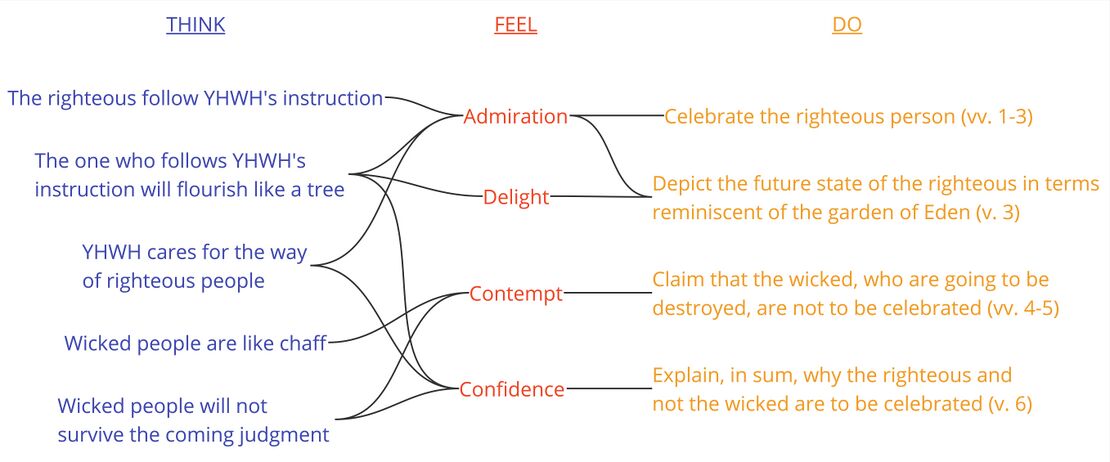Psalm 1 Emotional
From Psalms: Layer by Layer
Psalm 1/Emotional
Choose a PsalmNavigate Psalm 1
Emotional Analysis
This layer explores the emotional dimension of the biblical text and seeks to uncover the clues within the text itself that are part of the communicative intent of its author. The goal of this analysis is to chart the basic emotional tone and/or progression of the psalm.
For a detailed explanation of our method, see the Emotional Analysis Creator Guidelines.
Emotional Analysis Chart
If an emendation or revocalization is preferred, that emendation or revocalization will be marked in the Hebrew text of all the visuals.
| Emendations/Revocalizations legend | |
|---|---|
| *Emended text* | Emended text, text in which the consonants differ from the consonants of the Masoretic text, is indicated by blue asterisks on either side of the emendation. |
| *Revocalized text* | Revocalized text, text in which only the vowels differ from the vowels of the Masoretic text, is indicated by purple asterisks on either side of the revocalization. |
| Verse | Text (Hebrew) | Text (CBC) The Close-but-clear translation (CBC) exists to provide a window into the Hebrew text according to how we understand its syntax and word-to-phrase-level semantics. It is designed to be "close" to the Hebrew, while still being "clear." Specifically, the CBC encapsulates and reflects the following layers of analysis: grammar, lexical semantics, phrase-level semantics, and verbal semantics. It does not reflect our analysis of the discourse or of poetics. It is not intended to be used as a stand-alone translation or base text, but as a supplement to Layer-by-Layer materials to help users make full use of these resources. | The Psalmist Feels | Emotional Analysis Notes |
|---|---|---|---|---|
| 1 | אַ֥שְֽׁרֵי־הָאִ֗ישׁ אֲשֶׁ֤ר ׀ לֹ֥א הָלַךְ֮ בַּעֲצַ֪ת רְשָׁ֫עִ֥ים | Happy is the one who has not walked in the counsel of wicked people, | Admiration towards the person who follows YHWH's instruction and becomes like a fruitful tree (also, a steadily increasing delight in what happens to someone who follows YHWH's instruction) | SDBH on אַ֥שְֽׁרֵי: "accompanied by an attitude of admiration" |
| וּבְדֶ֣רֶךְ חַ֭טָּאִים לֹ֥א עָמָ֑ד | has not taken a stand in the way of sinful people, | |||
| וּבְמוֹשַׁ֥ב לֵ֝צִ֗ים לֹ֣א יָשָֽׁב׃ | and has not settled in the dwelling place of insolent people! | |||
| 2 | כִּ֤י אִ֥ם בְּתוֹרַ֥ת יְהוָ֗ה חֶ֫פְצ֥וֹ | Instead, his delight is in YHWH's instruction, | SDBH on חֵפֶץ: "state in which humans feel emotionally attached to a particular event." This emotion word pertains especially to the intended perlocution and perhaps also to the speaker's own affective tone. | |
| וּֽבְתוֹרָת֥וֹ יֶהְגֶּ֗ה יוֹמָ֥ם וָלָֽיְלָה׃ | and he meditates on his instruction day and night. | |||
| 3 | וְֽהָיָ֗ה כְּעֵץ֮ שָׁת֪וּל עַֽל־פַּלְגֵ֫י מָ֥יִם | And he will become like a tree transplanted beside water channels | The images in v. 3 are associated with positive emotions (productive tree, nourishing water source, garden of Eden imagery, fruit, leaves, flourishing). Given the highly descriptive nature of v. 3 (with its positively charged images), it would be appropriate, when performing the psalm, to show an increase in positive emotion and activation. Indeed, vv. 1-3 are best read with a steady increase of positive emotion and activation, climaxing in the poetically rich statement in v. 3d: "and he causes all that he does to flourish." | |
| אֲשֶׁ֤ר פִּרְי֨וֹ ׀ יִתֵּ֬ן בְּעִתּ֗וֹ | that gives its fruit in its season | |||
| וְעָלֵ֥הוּ לֹֽא־יִבּ֑וֹל | and whose leaves do not wither. | |||
| וְכֹ֖ל אֲשֶׁר־יַעֲשֶׂ֣ה יַצְלִֽיחַ׃ | And he will cause all that he does to flourish. | |||
| 4 | לֹא־כֵ֥ן הָרְשָׁעִ֑ים | Not so the wicked people! | Contemptuous towards the wicked (the opposite of admiration) | Verses 4-5 parallel vv. 1-3 and describe the wicked in terms that are opposite to the description of the righteous. If the celebration of the righteous in vv. 1-3 was characterized by "an attitude of admiration" (cf. SDBH), then we can imagine that the description of the wicked in vv. 4-5 would be characterized by the opposite of admiration, i.e., contempt. |
| כִּ֥י אִם־כַּ֝מֹּ֗ץ אֲֽשֶׁר־תִּדְּפֶ֥נּוּ רֽוּחַ׃ | Instead, they will be like chaff that the wind drives away. | The image of "chaff" (something worthless, to be discarded) further expresses and elicits the feeling of contempt. | ||
| 5 | עַל־כֵּ֤ן ׀ לֹא־יָקֻ֣מוּ רְ֭שָׁעִים בַּמִּשְׁפָּ֑ט | Therefore, wicked people will not stand firm in the judgment, | ||
| וְ֝חַטָּאִ֗ים בַּעֲדַ֥ת צַדִּיקִֽים׃ | and sinful people [will not stand] in the group of righteous people. | |||
| 6 | כִּֽי־יוֹדֵ֣עַ יְ֭הוָה דֶּ֣רֶךְ צַדִּיקִ֑ים | Because YHWH cares for the way of righteous people, | Confident that his teaching is true | If v. 6 functions as a summary statement grounding the whole psalm, the purpose of which is to convince the hearer that the way of the righteous is worth it in the end, then "confidence" would be an appropriate emotional tone (cf. Ps 37, which has a similar intented perlocution and sustains a tone of confidence throughout). |
| וְדֶ֖רֶךְ רְשָׁעִ֣ים תֹּאבֵֽד׃ | and the way of wicked people will come to an end. |
Affective Circumplex
The affective circumplex locates emotions on two axes: (1) positive vs. negative valence; and (2) active vs. passive activation. Since emotional terminology often carries unintended cultural connotations, the purpose of the circumplex is to ease translation of emotions across different languages and cultures.


